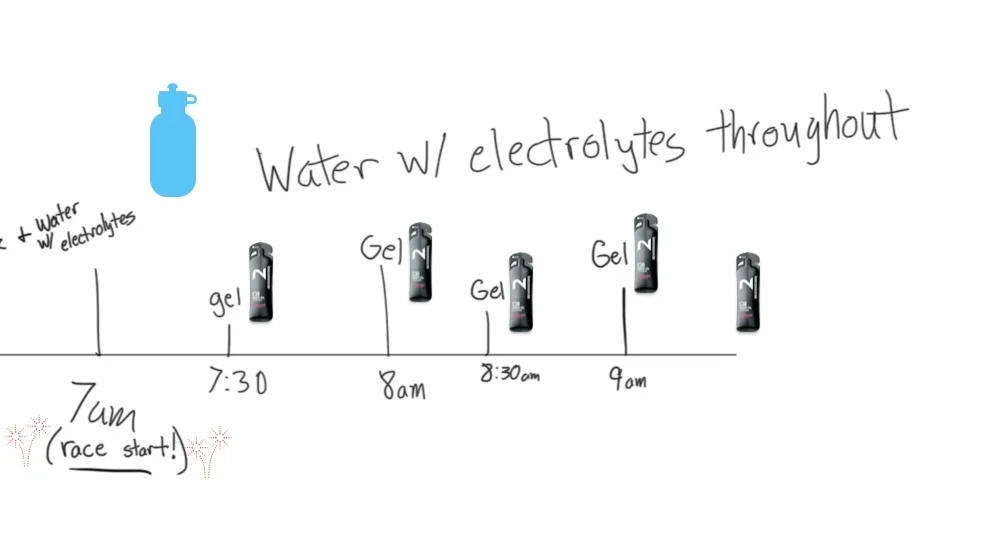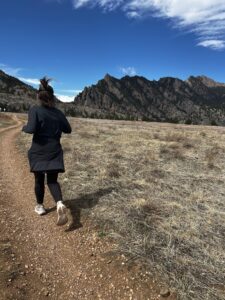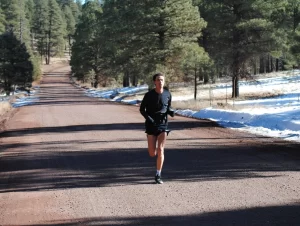When Should I be Fueling on Runs?
You should start taking in fuel during runs that are 90 minutes or longer.
Does this include interval workouts, quality sessions, and other types of faster workouts?
YES. The demand for carbohydrates as fuel goes up with intensity. It’s even more important to fuel during these faster, longer runs.
What should I be fueling with?

Good question. Lately, I’ve been using a combination of NeverSecond, Huma, and Untapped gels. I’ve tried almost every brand out there and have landed on these. It’s a combination of taste, how well they go down, and then waiting to see if your stomach can handle them for long periods. I like these options for gels because they have a more water-like consistency than a normal GU gel, so your mouth won’t get dry. Both are around 30g of carbs. So 1 every 30 minutes gets you to 60g of carbs an hour, which is an adequate place to be. BUT fueling and nutrition are very personal. There might be better options for you. Try some different products out! Every athlete I work with gets a discount at The Feed. It’s an incredible place to start. They almost always have a try-out pack that features a bunch of popular brands of gels, so you can start to see the differences in tastes and textures. This is important because it’s rare for athletes to stick with one product for their whole career. Athletes often use multiple types of gels or products during one race or run. Why? Well, after eating a large number of anything, it’s quite common to get tired of it and crave something different. If you don’t have a second option, you might not take in as much fuel as you need for optimal performance.
It’s quite common to experience fatigue from consuming the same gel for an extended period. It’s a good idea to have a variety of flavors, brands, and types of fuel to keep things interesting and balanced.
Do I have to use gels?
No, but there are reasons most people do.
The biggest reason is that you don’t have to chew gels! Chewing takes time and energy. Taking in all your fueling needs through liquids alone is much more difficult. It’s possible, and elite marathoners try to do it, but they usually don’t run more than two hours. They also have bottle service at every race. Most runners will not. You could carry all of that in a pack or hydration belt, but that extra weight will not be fun to carry around. A lot of runners utilize a combination of gels, energy chews, waffles, bars and various other snacks. There are a lot of different creative things to try out when it comes to that. Just make sure you’re practicing those other items MONTHS before the race you’re training for.

How often should I be fueling during runs?
Somewhere around every 30 minutes. It could be 25, it could be 40. The longer you take in between fueling, the harder it will be to get in enough carbohydrates for optimal performance. If a gel every 30 minutes feels like too much on the stomach, move the interval out until you have less GI distress.

How many carbohydrates do I need per hour, to run at the full capabilities of my fitness?
More. Here’s the deal. I’ve read almost every study on carbohydrate intake and endurance sports, and 99% of the time, they find that adding a little more carbohydrate dramatically improves performance. The limits to this are pretty much unreachable. Studies have found performance benefits of well over 100g of carbs an hour. There are very few folks who can run hard and take in 120g of carbs an hour. You will get uncomfortable, your stomach will hurt, and you’ll probably throw up. Not good. So, for us regular folks, we just want to get our numbers to nearly as high as we can without any stomach issues. 60g of carbs an hour is a solid starting out point. That’s a 30g of carbs gel every 30 minutes. From there, we can start to test if we can push that up to 70, 80, or even 90g of carbs per hour by shortening the interval between gels, adding in higher carbohydrate gels, or supplementing with a liquid carbohydrate mix. A lot of that depends on the logistics of what even we’re racing and many other factors. Somewhere between 60-90g of carbs an hour is where a lot of good performances happen.
But I’ve run A LOT of Long Runs with no fuel, and I was fine! Why do I need to add this in?! It feels like one more thing to think about!
You’re right. It’s not impossible to run 20 miles with no fuel or hydration. But it isn’t ideal and usually isn’t even safe. We can get away without fueling for some runs, especially 120 minutes and under, but I wouldn’t recommend it for several reasons.
One, it limits our performance. We want to run faster and stronger! We have a lot of studies that show runs utilizing carbs lead to better performances and times.
Second, if we practice our fueling before the event, we will be better prepared come race day. Did you know our stomachs can be trained? They can learn to handle certain types of fuel, and we can even train them to handle more fuel! But, just like running, we need to practice. Fueling during running draws blood and metabolic energy away from our heart, lungs, and legs and into the stomach to process the nutrients. We need to get more efficient at this. So we practice. Also fueling while running is kind of a skill! You have to learn how to store those gels, pull them out while running fast, open them up, try and extract the viscous slime that’s inside, and then dispose of the wrapper, all while running a marathon! It’s actually not that easy. So we need to practice it.

The last reason we need to be fueling during runs, even though it’s annoying, is that it will aid our recovery. We can be replenishing the muscle and glycogen stores before the run is even over. Just about everyone who starts fueling during the big runs and workouts will make a comment that it’s appeared to lead to better recovery. Running for hours and not fueling is really hard on the body. When we combine the stress of running for hours with the stress of our body thinking it’s being starved and desperately seeking calories, we are left with a recipe for disaster when it comes to recovery.
Okay, why about hydration?! How much should I be drinking, and what should I drink?
First, this topic is incredibly complex and drastically changes from event to event. A 40-degree marathon will have a significantly different hydration protocol from a 100k run in hot weather.
Let’s start with the marathon. It’s generally not wise to carry your own hydration because they have it on the course quite frequently. So, in this instance, you’re going to want to grab just about every available cup of water they have on course, usually the ones that have electrolytes.
If you’re in a race where you’re carrying your own hydration, a good starting out point is to get in 400ml of water with electrolytes an hour. For many people, it will be more, but this is not a bad place to start. Having at least a small amount of electrolytes in your water makes the fluid more absorbable in your body and helps prevent hyponatremia (where you have too much water and not enough electrolytes in your system).
Should I Keep Track of what I take in During the Run?
YES! You really should. I have this template where I have athletes write in every product so we can see how many carbohydrates, calories, and mg of sodium they took in per hour. You 100% should write down everything, so you have a log of what products you liked! As you start to learn your numbers, you will become an unstoppable long-distance running force! When you know how to fuel at a high level, your running will be elevated. You’ll run faster and recover quicker!
Okay, that’s all I got. Go try stuff out, and let me know what’s working for you!



